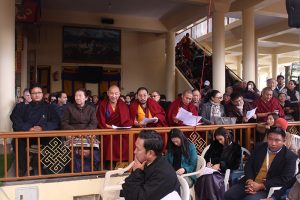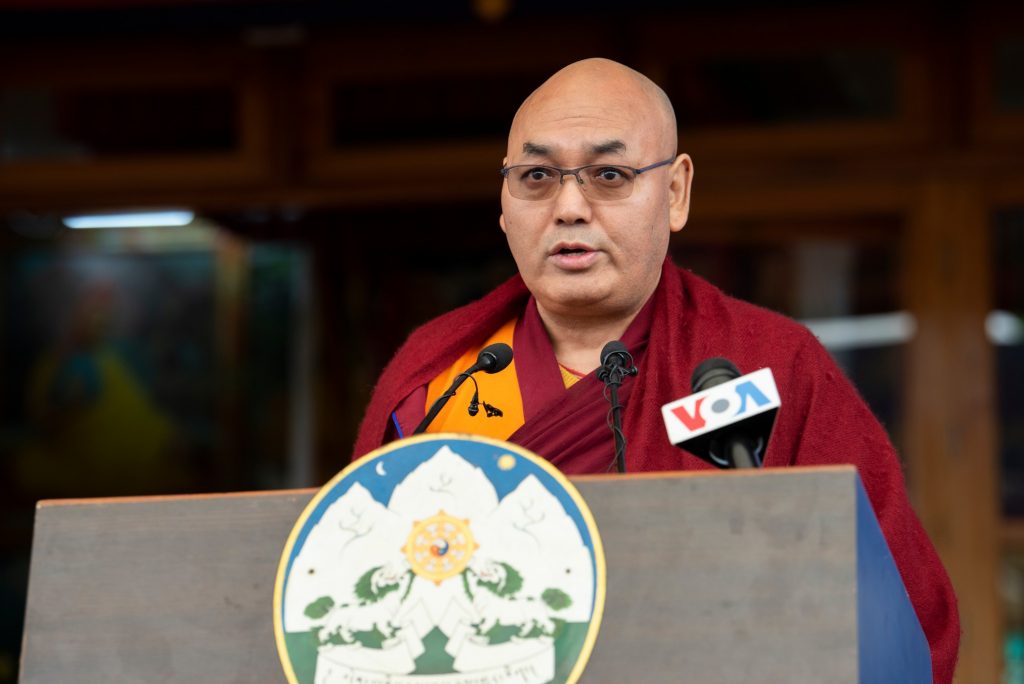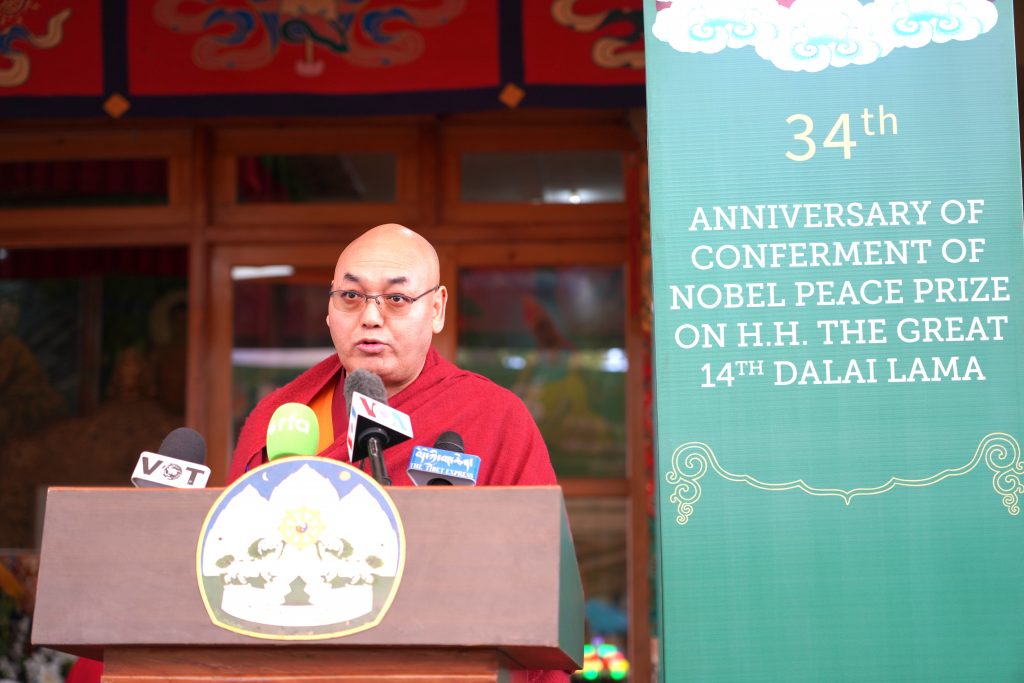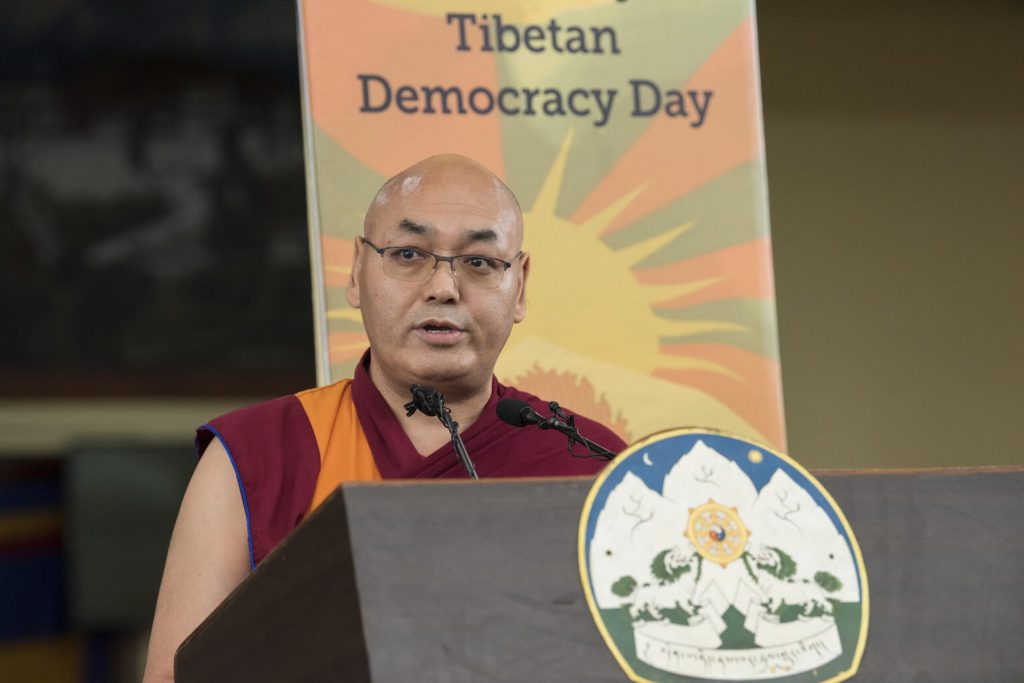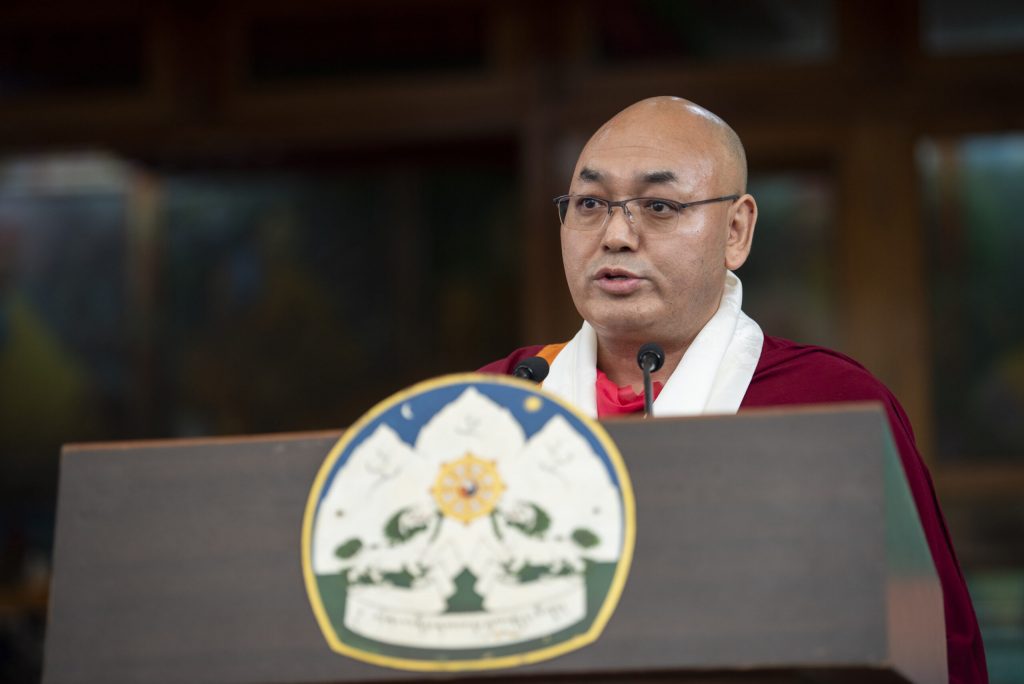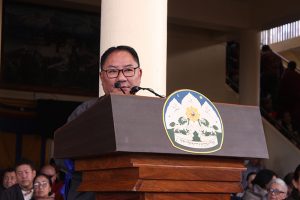
We are gathered here today to commemorate the 30th anniversary of the momentous occasion of the conferment of the globally distinguished Nobel Peace Prize on His Holiness the Dalai Lama, the master of all the teachings on this earth of the Buddha, the lotus-holding manifestation of the supreme Bodhisattva who is the head ornament of samsara and nirvana including the domain of the gods, the wellspring of affection who bestows mother-like fondness to all sentient beings even without any sort of previous acquaintanceship, a champion of world peace, the destined patron-deity of the Snowland of Tibet and its saviour for all lifetimes, and its unsurpassable leader and guiding light. On this glorious occasion, I, on behalf of all the Tibetan people in Tibet and in exile, offer greetings and express gratitude of infinite magnitude to His Holiness the Dalai Lama with countless joy, devotion and elation.
It was 30 years ago, on the international Human Rights Day of 10th of December in 1989 that His Holiness the Dalai Lama was presented with the world’s most distinguished peace award, the Nobel Peace Prize. To the Tibetan people in general and, in particular, to the people across the world who cherish democracy, freedom, peace, and compassion, it was a perfect moment to exalt the incomparable deeds of His Holiness the Dalai Lama with joy, devotion and elation and to thereby bask in the joyousness of the supremacy of the ten virtues underlying them.
With the nobility of kindness borne of the pristineness of the ideal and mannerism drawn from the incomparable Buddha, His Holiness the Dalai Lama has employed the potential and power of compassion – which is the essence of the condition underlying all sentient beings’ desire to live a happy life and their aversion to pain and suffering – to address their concerns. On that basis, His Holiness has sought to enhance the inherent ethical nature of human beings as a means to strive for the protection of the natural environment, harmony among different religious traditions, for the resolution of situations of war and dispute and so on across the world with a sense of universal responsibility for the goal of ensuring global peace. His work of unimaginable depth and expanse continues unabated. In particular, in these particularly great turbulent days and age of our degenerate era on this vast world, His Holiness has, through efforts at keeping up without decline the fine culture of the religiously immersed Tibet with the aspiration to convert in future this Land of Snows, the roof of the world, into a zone of peace. It is with this profound desire that His Holiness the Dalai Lama has set the course of the Tibetan people on the path of non-violence and peace.
In particular, all people with discerning intellectual faculty have expressed admiration for the nobility of His Holiness the Dalai Lama’s great, mutually beneficial middle way proposal for the resolution or the issue of Tibet. It has won him nothing less than the Nobel Peace Prize which he delightedly accepted for the sake of the sentient beings’ wellbeing. For such and numerous other secret deeds of body, speech and mind of unimaginable magnitude, which he has carried out and continues to do so even today as I speak, I offer His Holiness profound gratitude repeated a hundred times.
Likewise, today is also an important day marking the international Human Rights Day. In connection with this occasion, I wish to point out that on the 1st of October this year, the 70th anniversary of the founding of the so-called People’s Republic of China was observed. In the run up to the marking of this anniversary, China, in September, issued what it called a white paper on “Seeking Happiness for People: 70 Years of Progress on Human Rights in China” in the name of the State Council Information Office. The white paper made claims about progress having been introduced in the human rights situation in the People’s Republic of China under its successive topmost leaders during the past seventy years. Nevertheless, every year China has so far taken a front row seat among countries across the world with the worst record of upholding the human rights of its people. This by itself makes it clear that China’s claim about its progress in the field of human rights is patently false.
The so-called white paper made claims about China having granted Regional Autonomy for ethnic Minorities. To the people of Tibet, however, these have been nothing but years of horrendous repression marked by 70 years of territorial aggression and 60 years of deprivation of sovereign territory, with nothing good remaining to be said. The truth is that ever since the emergence of human civilizations, Tibet and China had co-existed as neighbouring countries. During the periods of Tibet’s Tsenpo rulers and some of China’s emperors there were incidents of intermarriage between the two royal families as well as wars and settlements of border disputes which ended with signing of uncle-nephew treaties which were inscribed on pillars of stone and so on. Historical records showing that Tibet and China were two separate countries are too glaring to be possible for anyone to erase it by blacking it out. Nevertheless, immediately after its founding of the People’s Republic of China, the army of its communist ruled government launched an invasion of Tibet and annexed the sovereign territory that had belonged to its original Tibetan inhabitants since the beginning of this world. Not only that, the communist Chinese government continued to launch in Tibet one campaign of mad and brutal repression after another, such as the Cultural Revolution, over the years. And it has been obvious that those campaigns were designed to deny the Tibetan people their freedom to make use of their own language and script, and their culture and traditions. There were even occasions when the Tibetan people were banned from even so much as moving their lips. It has therefore been obvious to everyone everywhere that the past decades were a tragic period of enormous brutality unprecedented in the history of Tibet with an underlying design on the part of communist ruled China to obliterate the Tibetan ethnicity. Given this reality, it was nothing but propaganda rhetoric on the part of the government of China to talk about having made efforts towards achieving progress in ensuring respect for human rights and its claims were devoid of any basis in substantive reality.
The white paper made claims about regional leaders in Tibet having emerged from the ranks of ordinary masses of people in the region. The reality remains, however, that over the last 60 years, 99 per cent of the top leaders of the counties, higher level offices and of cites in Tibet have been communist party members of Chinese ethnicity. Besides, there have been a total of 14 party general secretaries of the so-called Autonomous Region of Tibet established by China so far and all of them have been ethnic Chinese communist party members. None has been Tibetan, giving the lie to China’s claim about regional leaders being from among the ordinary masses of the concerned region. Likewise, the white paper also claimed that the linguistic heritage of the ethnic minorities had been given protection. The reality is that over the last 60 years, the government of China has split up areas inhabited by the Tibetan people to merge them with various Chinese provinces to thereby deny them the opportunity to protect their ethnic language and script. In fact, even within the so-called Autonomous Region of Tibet, Tibetan has been given the status only of second language. Besides, Mandarin Chinese has been made the medium of teaching in the educational institutions, with those having better knowledge of this language being given better marks in examinations and in selection tests, preference in job opportunities, and being given higher salaries and so on. All this is done in the name of implementing a policy of common national language across the People’s Republic of China. It has been starkly obvious that under this egregious policy, the ethnicity and culture of the Tibetan people have been sought to be systematically obliterated.
In particular, China strives to explain that there is respect for religious freedom and so on in Tibet under its rule and on that basis sends work team of its cadres to the monasteries where they coercively install television sets and force the monks and nuns to watch and listen to its propaganda that praise its policies as perfect and excellent. This deliberately obstructive purpose has been designed to divert the attention of the religiously devout Tibetan monks from their steadfast pursuits of spiritual listening, thinking, and meditating and from their three trainings of self-discipline, rapturous awareness, and sharpening of critical acumen through learning as part of their spiritual training and practice. Not only are all aspects of monastic learning and practices thoroughly disrupted but even the daily routines of the monks and nuns, including in terms of traveling, staying and doing things, are subjected to control. Thus, the religious freedom of the Tibetan people has been destroyed and they have even been banned from putting up any picture of their root spiritual master, His Holiness the Dalai Lama. Besides, a coercive precondition has been imposed on Tibetan graduates seeking any government related employment, requiring them to denigrate their root spiritual master, His Holiness the Dalai Lama, before their candidature could be even considered. Examples such as these are numerous. Throughout the period of the past 60 years of occupation rule, the communist Chinese government carried out a continuous succession of numerous campaigns of repression in Tibet in such names as democratic reforms, Cultural Revolution, Socialist Thought Reform Education, Education in Patriotism, and so on. To the Tibetan people in Tibet, therefore, the past 60 years have been nothing but a period which could only be seen as one of absolute deprivation of human rights and of bondage under the brutal repression of the communist Chinese government.
But that is not all. The atheist communist Chinese government, which rejects any sort of belief in past and future lives, issued in 2007 Regulations on Tibetan Buddhism and Rinpoche Reincarnation, a policy document published as the State Bureau of Religious Affairs Order No. 5. This action has only made the communist Chinese government an object of deprecating laughter by everyone. If it is indeed true, as claimed, that the government of China protects the reincarnation system of Tibetan Buddhism, the 11th Panchen Lama Gedhun Choekyi Nyima recognized by His Holiness the Dalai Lama should be seen enthroned on the seat of his predecessor Panchen Lama. But far from doing anything like that, the government of China has rendered him disappeared along with both his parents. And the question remains: Why does the government of China keep failing to provide a clear answer to all queries on his whereabouts made by the United Nations Human Rights Council?
The Communist Chinese government has never ceased to denigrate His Holiness the Dalai Lama, a champion of world peace, targeting him as its rival enemy. However, on the other hand, it seeks to claim that the power to recognize the reincarnation of His Holiness the 14th Dalai Lama vested in the communist Chinese government. This is an unabashed claim arising out of utter madness and amounts to a stark baring of the true face of the communist Chinese government for its continued unrestrained trampling on the freedom of religious belief of the Tibetan people. From the 3rd to the 5th of October this year, the Third Special General Meeting of the Tibetan People, which had representations from all the sections of the Tibetan people, was held. And all the participants in that meeting spoke with one voice to fervently pray with unshakeable devotion that His Holiness the 14th Dalai Lama, who is like the eyes on the forehead and the heart in the bosom of every Tibetan subject and their unsurpassable leader, may live for a hundred aeons; that, at the same time, He may, for the sake of the Buddhist faith and sentient beings, continue to appear in successive reincarnations for as long as sentient beings continue to sustain on the Snowland of Tibet. And the meeting reaffirmed that with regard to the reincarnation in future of His Holiness the Dalai Lama, the sole responsibility and authority for its determination resided in His Holiness the Dalai Lama himself and in the duly empowered officials of his Gaden Phodrang Trust and no one else. In particular, the meeting expressed resolute opposition to the so-called State Bureau of Religious Affairs Order No. 5 of 2007 through which China sought to implement a set of Regulations on Tibetan Buddhism and Rinpoche Reincarnation. Similar kinds of other egregious plots hatched by the government of China keeps on being brought out. The meeting also passed a unanimous resolution to make its position on this issue absolutely clear. Besides, from the 27th to the 29th of November recently, during the three-day 14th Tibetan Religious Conference of the Central Tibetan Administration, it was again reaffirmed that the authority of decision concerning the way and the manner in which the reincarnation of the 14th Dalai Lama should appear solely rests with His Holiness the 14th Dalai Lama himself. That no government or otherwise will have such authority. That if the Government of the People’s Republic of China for political ends chooses a candidate for the Dalai Lama, the Tibetan people will not recognize and respect that candidate. A special three-point resolution outlining these commitments was adopted at the meeting. All these moves have been made in efforts to protect the wishes of the Tibetan people in Tibet and in exile to preserve their right to practice their freedom of religious belief in keeping with their established Tibetan Buddhist traditions inherited through generation. I therefore wish to reiterate the point that the communist Chinese government, which regards religion as poison, can have no right whatsoever to interfere in the process for the recognition of the reincarnation of His Holiness the Dalai Lama and will also never be in a position to do so.
All too frequently the Chinese government speaks and propagates about the importance of friendly relations and stability. Nevertheless, in Tibet it has continued to carry out a relentless policy of uninterrupted violent repression. Also, it has continued to keep making distorted claims about the issue of Tibet, attempted to put up every conceivable kind of obstacles by every possible means whenever any group or organizations, but especially the Central Tibetan Administration, carried out any kind of activity related to the issue of Tibet. This is very obviously inconsistent with its claims about having concern for the importance of friendly relations and stability. Accordingly, it bears pointing out that the government of China should bring an end to these kinds of actions and behaviours which are designed only to cause damage to friendly relations and stability that it talks so much about. Likewise, the government of China says a great deal about being actively engaged in protecting human rights of the citizens of the People’s Republic of China. If this is indeed the intention, the communist Chinese government should, without being encumbered by any sort of morbid fear, bring to an end the highly depressing, brutally repressive policy of ethnic genocide that it is still actively implementing in Tibet.
Throughout the past 60 years of occupation rule, the government of China has trampled on the basic human rights of the Tibetan people; moved to exterminate Tibet’s religion, culture, language, and subjected the Tibetan people to brutally violent repression of inestimable magnitude. What is more, these have remained uninterrupted to this day. It is therefore of utmost importance that responsible international organizations and groups such especially as the United Nations, the United Nations Human Rights Council and others should carry out a result-oriented investigation of the current tragic situation in Tibet. The purpose should be to ensure that the communist Chinese government does not get away with its highly reprehensible conduct in Tibet as if there is nothing wrong with it. I accordingly urge the international community to strive in bringing China to the level of other progressive nations of the world in terms of having the highest of regards for the human rights of its people.
As I have already stated above, this is a day of outstanding significance and in places across the world people are commemorating this festive occasion with the remembrance of His Holiness the Dalai Lama’s deeds. The absolutely best way to repay gratitude to His Holiness would be to carry out his wishes with a sincerity of purpose. All Tibetan people should therefore unite as one and pool together whatever capabilities they may have as part of their diligent efforts to achieve the common fundamental good. Tibetan people living in free countries across the world should take their democratic duties as fundamental while taking care not to fall into the trap of becoming a tool of the other side to create disturbances on their behalf and I take this opportunity to remind everyone accordingly.
To sum up, I would like to express heartfelt gratitude to all the governments – especially the central government as well state governments in India – besides parliaments, prominent personages, private individuals, and the public at large across the world who have displayed attention, concern, solidarity, and support etc. for the just cause of Tibet. At the same time I urge all of them to continue their support for Tibet to an ever greater extent.
Finally, I pray that His Holiness the Dalai Lama may live for a hundred aeons that all his wishes may be seen fulfilled with spontaneity with the result that peace may prevail across the world and the just cause of Tibet may be achieved in all speediness.
The Tibetan Parliament-in-Exile
10 December 2019
. . . . . . . . . . . . . . . . . . . . . . . . . . . . . . . . . . . . . . . . . . . . . . . . . . . . . . . . . . . . . . . . . . . . . . . . . . .
* In case of any discrepancy between this English translation and its Tibetan original, the latter should be considered authoritative and final for all purposes.
